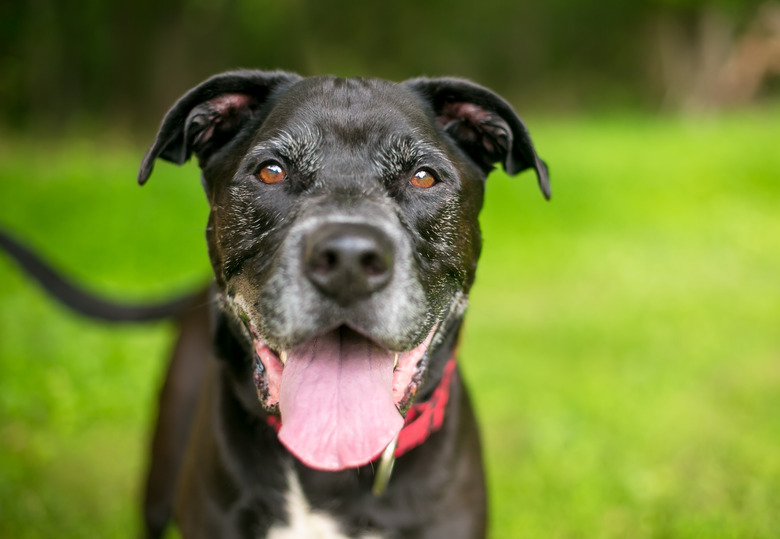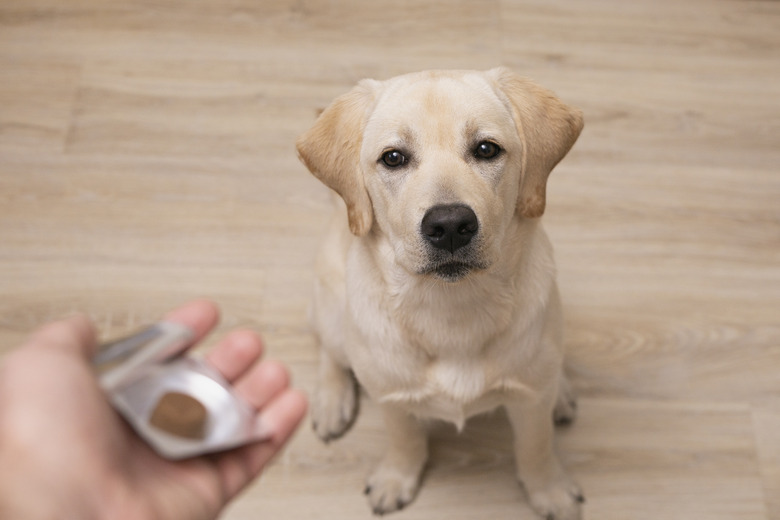How Much Boswellia Should A Dog Take?
Dogs can develop painful osteoarthritis in their joints, but prescription medications are not the best solution for every dog. Consider Boswellia serrata for dogs as a natural alternative to help treat a dog's joint pain and inflammation without the negative side effects of some prescription medication, such as liver and kidney damage. Be sure to discuss this and any other alternative treatments with your veterinarian to be sure they are suitable for your dog and won't interfere with any other medications he may be taking.
Tip
The recommended Boswellia dosage for dogs is 40 milligrams for every 1 kilogram, or 2.2 pounds, of body weight once per day.
Osteoarthritis signs and symptoms
Osteoarthritis signs and symptoms
Degenerative joint disease, or osteoarthritis, occurs when the cartilage in the joints begins to deteriorate. Without this protective cushioning, the joint becomes painful and inflamed. It will usually affect your dog's lower spine and legs.
Osteoarthritis can happen in any dog at any age. However, it is most common in older dogs, large breed dogs such as Great Danes and German shepherds, and obese dogs. Genetics and poor conformation may also increase the chances of a dog getting arthritis. Other risk factors include injuries, infections that affect the joint such as Lyme disease, and athletic activities that cause repetitive stress such as flyball.
Boswellia for dogs
Boswellia for dogs
Boswellia, also called Indian frankincense, is used in traditional Ayurvedic medicine for centuries to ease inflammation. It is a tree resin from the Boswellia tree that grows in India, North Africa, and the Middle East. The active ingredients in the resin include boswellic acids, volatile oils, and β-sitosterol.
Not much research has been done on the effects that Boswellia has on dogs. In humans, it is likely to be effective in reducing pain in patience with arthritis. While there is not enough scientific evidence to assess effectiveness, it is also sometimes used in patients with asthma, breast fibroadenoma, and stress incontinence.
One study in dogs showed that dogs who were given Boswellia for six weeks showed decreased lameness and pain. Studies have not been done to show whether Boswellia is safe to take or give your dog over the long term.
Boswellia dosage for dogs
Boswellia dosage for dogs
Always consult a veterinarian before beginning any supplement and be sure to mention any other medications your dog is taking. The dosage varies based on your dog's weight. For every 2.2 pounds of body weight, give 40 milligrams of Boswellia. Give Boswellia once per day.
Packaged Boswellia supplements are available for dogs, which may contain other ingredients as well. Follow the recommended dosage on the product label.
Boswellia is not well studied in dogs; however, it does not seem to have any serious side effects. It may cause gastrointestinal upset in your dog. Consider giving the supplement with food if your dog experiences this. Contact your vet if the side effects seem severe or you think your dog may be having an allergic reaction.
Other joint supplements for dogs
Other joint supplements for dogs
Some other joint supplements and treatments to consider and discuss with your veterinarian include joint supplements such as glucosamine and chondroitin. These have proven to be effective in reducing inflammation in both humans and dogs. Non-steroidal anti-inflammatory medications, or NSAIDs, are also an effective way to reduce inflammation and pain, but also pose a risk to liver and kidney function if given over a long period of time.
Your vet may offer other treatment options to consider such as acupuncture, cold therapy, and physiotherapy. It is also important that your dog maintain his optimal weight as any extra pounds place added pressure on his joints and cause more pain.
Always check with your veterinarian before changing your pet's diet, medication, or physical activity routines. This information is not a substitute for a vet's opinion.


